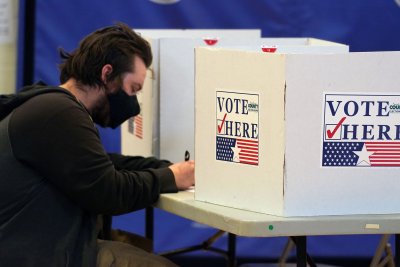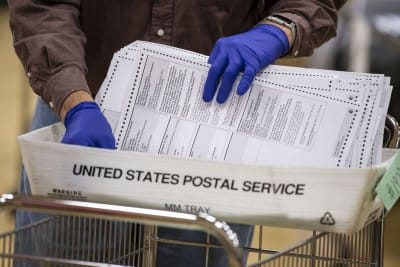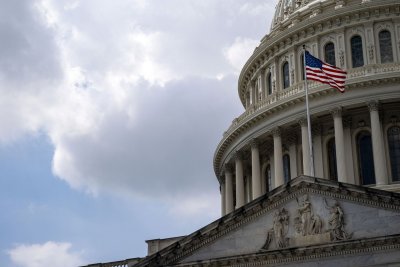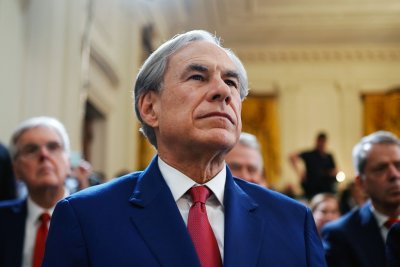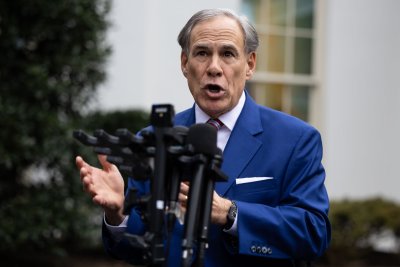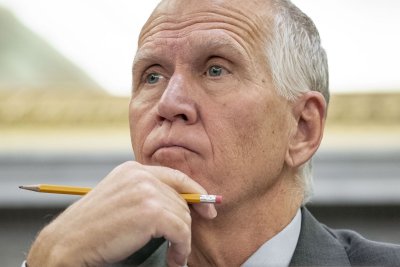Aug. 26 (UPI) — President Donald Trump‘s wish to end mail-in voting is only part of his grander vision for fundamentally changing the election process, experts say.
Mail-in voting has been the target of the president for years and it is again garnering his attention. As president he does not have a direct role in election administration but by sowing mistrust in the results he is still capable of ushering in change.
“The president has no role with respect to election administration or setting election rules of anything of that nature,” Jonathan Diaz, director of voting advocacy and partnerships with Campaign Legal Center, told UPI. “The Constitution is crystal clear that the primary responsibility for setting election rules lies with the states, subject to modifications from Congress.”
Trump alleges that mail-in voting is rife with fraud, a claim that has routinely been disproven by election audits and federal investigations, Diaz said.
“His own Department of Justice during his first term said there was no evidence of any widespread voter fraud in the 2020 election,” Diaz said. “Countless studies and investigations and attempts have turned up virtually nothing. Isolated incidents that haven’t affected the outcome of elections at most. There is no basis to support any of the president’s views on vote-by-mail or the integrity of our election system in general.”
About one-third of voters participated in the 2024 general election by casting mail-in ballots.
Universal vote-by-mail
When Trump takes to social media or the podium to air his grievances with voting by mail, he does so in broad terms. Charles Stewart, director of the MIT Election Lab and professor of political science, told UPI that Trump’s issue is actually with universal vote-by-mail.
Eight states and Washington, D.C., conduct universal vote-by-mail, meaning they send mail-in ballots to all registered voters without requests. Those states are California, Colorado, Hawaii, Nevada, Oregon, Vermont, Washington and Utah. Whether a voter intends to vote by mail or not, they still receive a ballot.
Universal vote-by-mail expanded to California, Vermont, Nevada, Hawaii and Washington, D.C., in 2020 or later. Stewart said some of the expansion was in response to the COVID-19 pandemic.
“There ended up being a bit of a back-and-forth in the early days between Democratic activists and Republicans about whether everybody in America should be mailed a ballot,” Stewart said. “That has morphed over the years into this kind of partisan divide over this practice of mailing everybody a ballot.”
Utah, the only universal vote-by-mail state that leans Republican, passed a bill earlier this year to change its mail-in voting process. Voters will no longer automatically receive a ballot in the mail beginning in 2029. Instead, they must request one.
“Thus far, for all the political talk at the top about discouraging vote-by-mail, once voters have taken a bite of that apple, they like the apple,” Stewart said. “Once the candidates and their advisers, their campaign advisers, have learned to campaign with mail being a predominant part of the election they also have a hard time giving it up. In Utah they’re going to roll back mail voting but there’s still going to be a lot of mail voting.”
Challenges for administrators and voters
Whether Trump hopes to see an end to universal vote-by-mail or mail-in voting in general, he cannot achieve either through executive order. It would require an act by U.S. Congress.
Ending vote-by-mail in any fashion would be a major disruption for election administrators at the state level, Stewart said.
“It would certainly be a great reevaluation of how they administer things,” he said. “They would have to very quickly turn on a logistical dime to make it work. They did it in 2020 on the other side.”
Some of the logistical challenges that universal vote-by-mail states and states with heavy mail-in voting participation would face include finding additional poll workers and polling places, along with the costs associated with these additions. This would raise the costs of election administration for taxpayers.
“Many of these places will have some memory of doing elections in person but they will not have the tens of thousands, if not hundreds of thousands of local voting locations that will be needed on Election Day,” Stewart said. “They will have to recruit and deploy on Election Day, so there will be a real, major scrambling to make this happen. They will have no choice in the matter but it will be very expensive and very disruptive.”
Losing access to the option to vote by mail would also be consequential for many voters who otherwise may not be able to participate in their elections.
Sophia Lin Lakin, director ACLU Voting Rights Project, told UPI that mail-in voting is crucial for people with disabilities and mobility issues, seniors and people who lack reliable access to transportation.
According to the U.S. Census Bureau, voters who are 65 and older voted by mail at the highest rate of any age group in the 2022 midterm elections. About 38% voted by mail.
Mail-in voting also levels the playing field of participation for voters across the socioeconomic spectrum. Voters with family incomes ranging between under $10,000 and more than $150,000 per year voted by mail at similar rates, between 24% and 36%.
“Many Americans juggle multiple jobs or irregular schedules and mail-in voting provides the flexibility needed for those voters to participate in democracy without sacrificing a paycheck,” Lakin said. “Ending it would disenfranchise many communities that already face systemic barriers to voting.”
Trump administration’s other election changes
The Trump administration has already taken other measures to change the election process in the United States while continuing the pattern of sowing doubt in the election he lost in 2020.
In March, Trump issued an executive order to restrict the acceptance of mail-in ballots received after Election Day and tighten the proof of citizenship requirements for voter eligibility. It also threatened to withhold federal funding from states that fail to comply.
A federal judge granted an injunction to stop the proof-of-citizenship requirement from taking effect.
Trump’s order charged the Department of Homeland Security and Department of Government Efficiency with scanning state voter registration rolls and federal immigration databases in an effort to identify foreign nationals.
The president has applied political pressure to lawmakers in Texas and other states to redraw their congressional maps to be more favorable for Republicans ahead of the 2026 midterm election.
Trump’s legislative agenda, passed in July, reduced funding for national cybersecurity, raising concern that U.S. elections, among other things, could be more vulnerable to interference from bad actors. The Trump administration has fired more than 100 employees from the Cybersecurity and Infrastructure Security Agency, the federal government’s chief cybersecurity arm.
Attorney General Pam Bondi has cut the leadership and many of the employees working in the voting section of the Civil Rights Division. The voting section enforces federal voting rights laws including parts of the Voting Rights Act, the National Voter Registration Act, Help America Vote and the Uniformed and Overseas Citizens Absentee Voting Act.
The voting section has halted all investigations into potential Voting Rights Act violations.
Voting section
Pamela Karlan, professor of law at Stanford Law School, told UPI that the Trump administration’s overhaul of election law enforcement is unlike anything ever seen in American history.
Karlan served as the former principal deputy assistant attorney general under former President Joe Biden‘s administration.
“I don’t think there’s ever been a time where they just outright stopped enforcing the Voting Rights Act,” Karlan said. “There has been more vigorous enforcement during some administrations than others. That has not traditionally been a partisan issue. But I don’t think we’ve ever had an administration that was outright not committed to enforcing any part of the Voting Rights Act.”
“The idea that the voting section isn’t in the game is really troubling, because the voting section has brought and won some of the most important voting rights cases in our history,” she continued.
Reducing the staff in the voting section and its overall capabilities greatly puts overseas voters and deployed military service members at risk of not being able to participate in elections.
“Almost every election cycle the voting action has had to deal with problems of getting ballots to overseas voters and to military voters in a timely manner,” Karlan said. “Almost every federal election cycle, the department has a bunch of UOCAVA responsibilities and really nobody else is going to enforce that.”
Karlan sees little opportunity for recourse if the voting section does not enforce election laws or actively protect the rights of voters, short of action by Congress. She still expects most election administrators will follow the law but the small few who do not will present significant problems.
“For the most part, state and local jurisdictions comply with the law,” she said. “Prior to the enactment of the Voting Rights Act we had rampant violations of the Constitution when it came to voting rights. Massive disenfranchisement. Purposeful vote dilution and the like.”
“Most election officials want to comply with federal law,” she continued. “But when it comes to the outliers, the lack of any federal enforcement is deeply problematic.”





